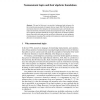Free Online Productivity Tools
i2Speak
i2Symbol
i2OCR
iTex2Img
iWeb2Print
iWeb2Shot
i2Type
iPdf2Split
iPdf2Merge
i2Bopomofo
i2Arabic
i2Style
i2Image
i2PDF
iLatex2Rtf
Sci2ools
114
click to vote
CSL
2006
Springer
2006
Springer
Nonmonotonic Logics and Their Algebraic Foundations
The goal of this note is to provide a background and references for the invited lecture presented at Computer Science Logic 2006. We briefly discuss motivations that led to the emergence of nonmonotonic logics and introduce two major nonmonotonic formalisms, default and autoepistemic logics. We then point lgebraic principles behind the two logics and present an abstract algebraic theory that unifies them and provides an effective framework to study properties of nonmonotonic reasoning. We conclude with comments on other major research directions in nonmonotonic logics. 1 Why nonmonotonic logics In the late 1970s, research on languages for knowledge representation, and considerations of basic patterns of commonsense reasoning brought attention to rules of inference that admit exceptions and are used only under the assumption of normality of the world in which one functions or to put it differently, when things are as expected. For instance, a knowledge base concerning a university shoul...
Automated Reasoning | Commonsense Reasoning | CSL 2006 | Major Nonmonotonic Formalisms | Nonmonotonic Logics |
Related Content
| Added | 22 Aug 2010 |
| Updated | 22 Aug 2010 |
| Type | Conference |
| Year | 2006 |
| Where | CSL |
| Authors | Miroslaw Truszczynski |
Comments (0)

